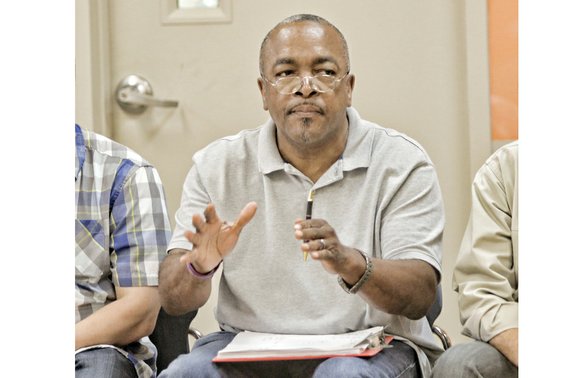‘Doing God’s work’ at The Healing Place
Joey Matthews | 8/27/2015, 6:48 a.m.

Al Jackson drank alcohol, snorted cocaine and smoked crack cocaine for 24 years.
“I was suicidal, I was lost and I had no hope,” he recalls of those dark days.
Today, he’s celebrating 15 years of sobriety and serves as the program director at The Healing Place on South Side. It is a long-term recovery facility for Richmond area men 18 and older who are seeking treatment for alcoholism or drug addiction.
“It’s not about me,” said Mr. Jackson, who oversees recovery programs at the facility at 700 Dinwiddie Ave. “It’s about helping those men coming behind me. I’ve been where they’ve been. I see this as doing God’s work. He has restored me back to sanity.”
He says he got sober after he entered The Healing Place program in Louisville, Ky. “I was pretty much in the gutter by then,” he said.
“My life has never been the same since then,” he said.
Mr. Jackson is now married with children and grandchildren. He has been in his leadership post at the Richmond Healing Place for 10 years.
The Healing Place operates under the umbrella of CARITAS, a Richmond-based shelter provider for homeless people.
The facility opened in 2005 after the Richmond Task Force on Homelessness identified a major need for addiction recovery resources for homeless men in Richmond, according to The Healing Place website.
Men usually stay from eight to 10 months in the facility, then move into an apartment community on South Side where they can stay up to a year as they transition back into society.
The men undergo job training, are connected to employment opportunities and most have a job when they leave The Healing Place.
The Healing Place is a 214-bed program, which includes the transitional apartments. There are 178 beds at the facility on Dinwiddie Avenue.
On average, The Healing Place operates at about 85 percent of its capacity, said Karen Stanley, chief executive officer at CARITAS.
While living at The Healing Place, men work on their recovery and take classes from the Recovery Dynamics curriculum, which is modeled after the 12-step program of Alcoholics Anonymous. They also attend AA and Narcotics Anonymous meetings.
Near the beginning of their recovery journey, the men are required to walk from The Healing Place in the morning partnered with other clients to classes and meetings, mostly located a couple of miles away in Downtown.
The challenging legwork is designed in part to help the men take ownership of their recovery process.
They are encouraged to develop a network of other recovering people at the meetings and find a sponsor to lead them through the 12 steps of recovery.
In different phases at The Healing Place, the men transition off drugs and are educated about the recovery process. They attend numerous 12-step meetings. They also confront and encourage each other in spirited “community” meetings of 50 or more clients led by Mr. Jackson, and serve as mentors to newer clients. As they progress, they are assigned jobs inside the facility and later at the CARITAS Furniture Bank located a few blocks away at 1125 E. Commerce Road.
Separately, The Healing Place also has an overnight emergency shelter open to men with nowhere else to stay.
“This a program of attraction,” said Ms. Stanley.
“Men who come into the overnight shelter might see somebody that they’ve gotten high with or drunk with in the past, and they see them six months down the road and say, so and so looks good and say, ‘If they can do it, I can do it,’ and decide to enter our program.’’
Men of all ages, ethnicities and social backgrounds come to The Healing Place to seek recovery.
Two men currently staying at The Healing Place are 61-year-old Eric Rice of Lawrenceville, N.C., and 21-year-old Kunyri Brent of Ahoskie, N.C.
“I was living in a motel on Midlothian (Turnpike) before I came here,” said Mr. Rice, who entered the program about five months ago. “I couldn’t pay my rent. My only friend was the (crack cocaine) rock.
“Every time I hit the pipe, things would get worse. I thought to myself, ‘What am I doing?’ I knew I needed to do something to get help. I thought, ‘What harm could I do by coming here?’ ’’
He said the toughest part for him has been staying committed to the program.
“It’s difficult for me just to sit still,” Mr. Rice said. “I am a person with little patience. I used to rush all the time. I am learning to literally take it one day at a time here.”
He said The Healing Place has been a godsend.
“This may sound funny, but I consider my addiction to be a blessing to me,” Mr. Rice said. “I never knew I could be around so many users that had so much compassion. I’m just thankful and grateful for that.”
Mr. Brent said he moved to Richmond to live with his father and attend a private religious school. “I had some behavior issues,” he said.
He said he had been drinking alcohol since age 15 and it had become a problem for him.
“I was pretty much hopeless,” he said when he entered The Healing Place in February.
“I came here for me. I needed a change. I want a new lifestyle. I needed something greater than me to help restore me to sanity,” he added. “I’m trying to embrace the process.”
Clients are not charged to stay at The Healing Place, which relies on donations from area businesses, congregations, foundations and individuals to provide recovery services. Donations can be sent to CARITAS, P.O. Box 25790, Richmond, Va. 23260.






